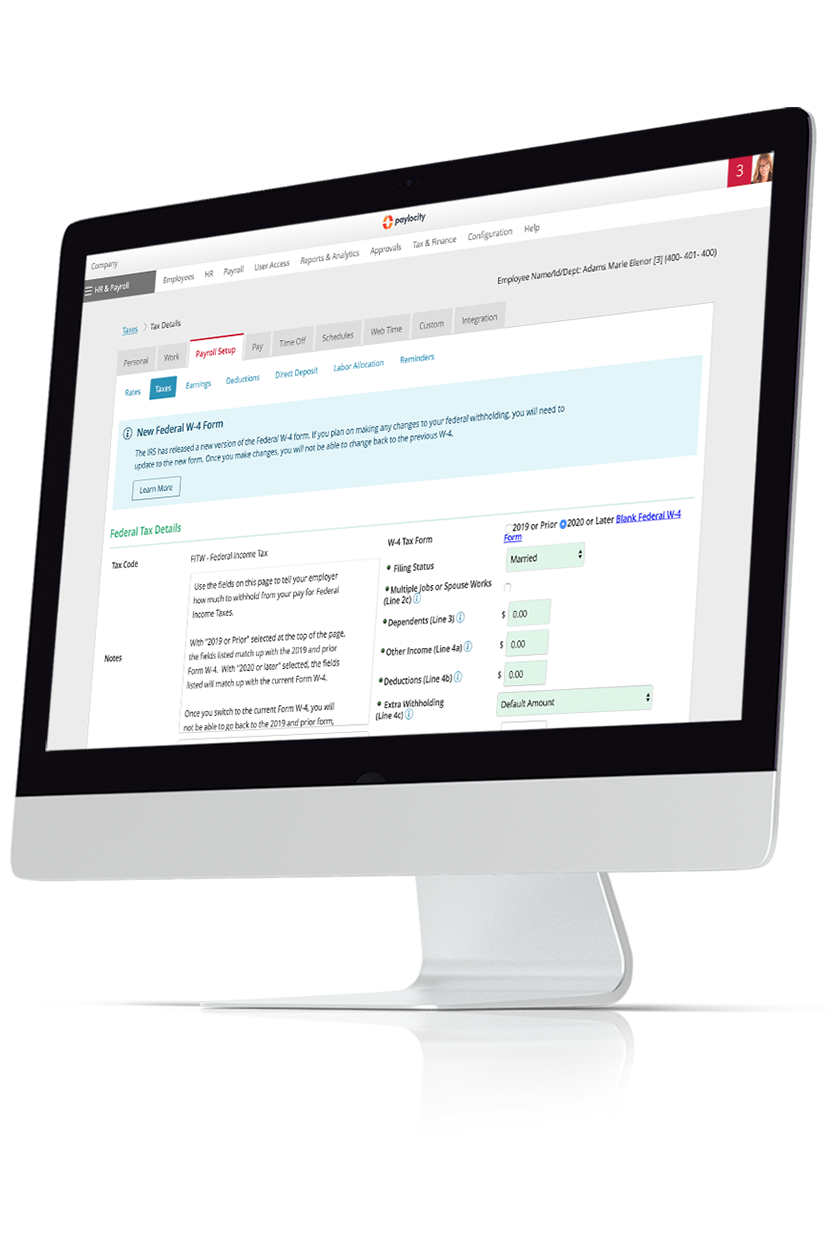Connecticut Payroll Tax Facts
January 17, 2025
Having to comply with unique state taxes and wage laws can make processing payroll doubly daunting. Here’s everything you need to know about these rates and laws for the state of Connecticut.

Connecticut uses minimum wage rates that are substantially higher than the rates required by the federal government in the Fair Labor Standards Act (FLSA). In fact, the statewide rate is over double the rate required by the federal government, and several cities have equally high or greater wage rates for local contractors.
When it comes to processing payroll, Connecticut-based organizations must handle the following taxes in addition to those required by the federal government:
- Personal Income (a.k.a. State Income Tax)
- State Unemployment Insurance (SUI)
- Paid Family and Medical Leave (PFML)
The below information was last updated January 17, 2025. It is not intended as legal or tax advice.
Connecticut Payroll Tax Rates
Connecticut State Income Tax (SIT)
Connecticut's SIT is progressive, meaning it adjusts based on the income level of the employee paying the tax:
| Filing Status | Income Tax Bracket [Over X] - [But not over Y] |
2025 Income Tax Rate |
| Single / Married (filed separately) | $0 - $10,000 | 2.20% of excess over $0 |
| $10,000 - $50,000 | $200 + 4.50% of excess over $10,000 | |
| $50,000 - $100,000 | $2,000 + 5.50% of excess over $50,000 | |
| $100,000 - $200,000 | $4,750 + 6.00% of excess over $100,000 | |
| $200,000 - $250,000 | $10,750 + 6.50% of excess over $200,000 | |
| $250,000 - $500,000 | $14,000 + 6.90% of excess over $250,000 | |
| $500,000 or greater | $31,250 + 6.99% of excess over $500,000 | |
| Married (filed jointly) | $0 - $20,000 | 2.20% of excess over $0 |
| $20,000 - $100,000 | $400 + 4.50% of excess over $20,000 | |
| $100,000 - $200,000 | $4,000 + 5.50% of excess over $100,000 | |
| $200,000 - $400,000 | $9,500 + 6.00% of excess over $200,000 | |
| $400,000 - $500,000 | $21,500 + 6.50% of excess over $400,000 | |
| $500,000 - $1,000,000 | $28,000 + 6.90% of excess over $500,000 | |
| $1,000,000 or greater | $62,500 + 6.99% of excess over $1,000,000 | |
| Head of Household | $0 - $16,000 | 2.20% of excess over $0 |
| $16,000 - $80,000 | $320 + 4.50% of excess over $16,000 | |
| $80,000 - $160,000 | $3,200 + 5.50% of excess over $80,000 | |
| $160,000 - $320,000 | $7,600 + 6.00% of excess over $160,000 | |
| $320,000 - $400,000 | $17,200 + 6.50% of excess over $320,000 | |
| $400,000 - $800,000 | $22,400 + 6.90% of excess over $400,000 | |
| $800,000 or greater | $50,000 + 6.99% of excess over $800,000 |
|
Additional Connecticut SIT Details |
|
|
Supplemental Withholding Computation |
Add the supplemental compensation to overall compensation and use the corresponding rate above. |
|
Valid Filing Statuses |
|
|
Exemptions |
|
|
Form W-4 |
Form CT-W4 |
|
Reconciliation Frequency |
Annual |
Connecticut State Unemployment Insurance (SUI)
SUI provides unemployment benefits to eligible workers who are unemployed through no fault of their own (as determined by state law) and meet the state’s eligibility requirements.
|
Connecticut SUI Tax Details |
|
|
Taxable Wage Base |
$26,100 |
|
Employee Subject to Tax |
No |
|
Rates for Experienced Employers |
1.10% - 8.90% |
|
Rates for New Employers |
2.20% |
|
Effective Period |
Calendar Year |
|
Voluntary Contributions Allowed |
No |
Connecticut State Disability Insurance (SDI)
SDI benefits are funded by employees through mandatory payroll deductions from each paycheck. Connecticut, however, doesn't require employers to collect an SDI tax.
Connecticut Paid Sick Leave (PSL) Tax
The state of Connecticut doesn’t require employers to collect PSL taxes, but it does have a program providing such leave to eligible employees:
| Connecticut PSL Details | |
| Covered Employers | All with 25 or more Connecticut-based employees* |
| Covered Employees | All |
| Accrual Method(s) | One hour per 30 hours worked |
| Annual Accrual Maximum | 40 hours |
| Carryover Maximum | 40 hours |
| Probationary Period | Yes; employees have to work 680 hours of employment before using sick leave |
| Wage Replacement | Either the worker's normal hourly wage OR the minimum fair wage rate during the leave, whichever is greater. |
| FAQs | Paid Sick Leave Guidance |
* Tiered implementation until January 1, 2027, at which time the number of employees will be one.
Connecticut Paid Family and Medical Leave (PFML) Tax
Like SDI, Connecticut's Paid Family Leave (PFL) program is funded via mandatory payroll deductions from an employee's gross pay:
| Connecticut PFL Details | |
| Covered Employers | All with one or more employees |
| Covered Employees |
Those who have both earned at least $2,325 in the highest quarter of the first four of the five most recently completed quarters and are either:
|
| Tax Rate | 0.50% |
| Wage Base Limit | $176,100 |
| Maximum Leave Available | 12 weeks |
| Wage Replacement* |
|
| Wage Replacement Cap | The state's minimum wage rate multiplied by 60 (i.e., $900) |
| Online Registration | CT Paid Leave Homepage |
| Payments Due | Quarterly |
| FAQs | Paid Family Leave FAQs |
*For example, if Employee A's weekly wages are $600, their weekly wage replacement during leave would be $570 (600 x 0.95 = 570). However, if Employee A's weekly wages were $650, their weekly wage replacement during leave would instead be $600 ( (600 x 0.95) + ([650 - 600] x 0.60) = 532).
Miscellaneous Connecticut Tax Information
Connecticut Reciprocal Agreement(s)
Reciprocal agreements are when workers who live and work in different states are only required to pay taxes to the state where they live. Connecticut currently has no reciprocal agreements with any other states.
This doesn’t mean, however, that interstate workers living in Connecticut pay double. It’s federally illegal for two states to tax the same income. In most cases, the employee’s work state will credit or refund them at tax time based on the taxes they owe their home state. If the tax rates differ, the employee must cover the difference.
Connecticut Minimum Wage Rates
|
Wage Type |
Connecticut Rates |
Federal Rates |
|
Minimum Wage |
$16.35 |
$7.25 |
|
Tipped Minimum Wage |
$8.23 |
$2.13 |
|
Actual Tip Credit |
$8.12 |
$5.12 |
Paying Payroll Taxes in Connecticut
Connecticut Employer Registration
The agencies below can help with your state-based employer registration, including best practices, account numbers, and unemployment information. Contact the Department of Revenue for withholding tax topics and the Department of Labor for unemployment tax topics.
|
Registration Details |
Department of Revenue |
Department of Labor |
|
Phone |
(860) 297-5962 | (860) 263-6000 |
|
Online Registration |
myconneCT Homepage | ReEmployCT Registration Page |
|
Registration Instructions |
Online registration is required. Account numbers will be issued in 1-2 weeks. | Online registration is required. Account numbers will be issued during the online process. |
|
Employer Self-Service Login |
myconneCT Homepage | ReEmployCT Login Page |
Additional Connecticut Payroll Tax Resources
- Connecticut SUI Tax FAQs
- Department of Revenue Tax Forms
- Department of Revenue Business Information Page
This information is provided as a courtesy and may be updated at any time. It is not intended as legal or tax guidance. If you have questions or concerns, we encourage you to seek the advice of a qualified CPA, tax attorney, or advisor.

Get Taxes Done Right, Without the Stress
We know there's a lot that goes into preparing and filing payroll tax forms. Save time and get support from our expert team. As a Registered Reporting Agent with the IRS, we can help prepare and file all the necessary forms you need to remain compliant - even in the face of changing legislation. Learn more here.